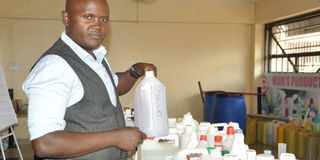In pursuit of profits, society

Andrew Mutumba, chief executive officer Mums Products Uganda Limited at his offices at Kamu Kamu plaza in Kampala. Photo by Eronie Kamukama
What you need to know:
- Experiences elsewhere. A trip to Turkey and Germany changed how he thought the detergent business should operate. “I realised there are companies that do business to business manufacturing of raw materials and it sold me the idea of working with them to change the detergent sector here,” Mr Mutumba says.
Past years have seen the rise of several cosmetic companies in Uganda as local entrepreneurs tap into need for skin and hair products for African men, women and children.
Mr Andrew Mutumba, chief executive officer Mums Products Uganda Limited, is one of those who carved out his place in the market. Four years into cosmetic production, he thought he could venture into detergents.
He started with liquid soap but realised it was not enough to break into the market given the stiff competition and nature of the local market whose consumption is dependent on price instead of quality.
Making detergent
After talks on how he could control the production of these detergents in Uganda, he zeroed down to creating them.
“Selling the concentrates to me was a good concept because it was an easy way of doing production. But I told them what if I went back to my country and encouraged other people to come on board so that the unemployed and employed can earn,” Mr Mutumba says. That was 2018 and the Turks did not buy the idea until 2019 when they gave a nod to Mr Mutumba’s strategy of creating jobs using his production line.
Mr Mutumba always wanted to be a lawyer growing up, but he graduated from Makerere University with a bachelor’s degree in social sciences and spent four years unemployed.
“I spent them writing curriculum vitae and up to this day, no one has ever called me,” he says.
Creating employment
He later found his way into media marketing and 11 years later, it remains difficult to hide his passion for the unemployed.
“There are so many cars on this market and people are looking for good engine cleaners. We can make final products. We can start carpet cleaning businesses from our homes. People want quality air fresheners and people can learn to make them and put them in the market,” Mr Mutumba says.
Challenges
Sadly, when it came to starting his own business, for the first weeks, there was barely money to ship the first container of raw materials. “It was a hustle to convince people to come on board, to convince banks,” he says.
“I needed about Shs70m initially. Someone eventually partnered with me. It opened doors because then the manufacturers took us seriously.”
First batch
In September 2019, Mr Mutumba received the first batch of concentrates. That only marked the beginning of his dreams. The plan is to start with four products and scale to hundreds of products within five years.
“Next year, we will be shipping in the raw materials to make the concentrates that will be serving Africa and not just East Africa,” he says, “we will build a brand so that people can tap into what we have.”
He says the idea of locally made detergents such as air fresheners, stain removers or carpet shampoos is fairly new and it will take time to be accepted. Today, he has invested $30,000 in the new business.
What is pushing Mr Mutumba’s detergent business so far is adding an element of social entrepreneurship. The business maximises profits while society wins too, he believes. Or you could say, the money arrives once society is financially empowered to purchase products on the market.
Training
This November, he trained the first group of people to start their home businesses. That training includes providing soft skills in marketing their products as well.
“It is a business that looks at empowering other people. It is not easy for a business to give away its formulae to others,” Mr Mutumba says.
“We were able to train around 300 people and those are already onboard as customers and if everyone employs five people, it becomes a chain of businesses.”




